- Home
- slideshows
- miscellaneous
- I tried to buy a gun at Walmart twice and roadblocks left me empty-handed both times
I tried to buy a gun at Walmart twice and roadblocks left me empty-handed both times
I hit a road block before I even left the house.

After hours of Googling and phone calls, I finally had a breakthrough and found a Walmart store that sells guns.

Someone answered the phone at a Walmart supercenter in Chesterfield, Virginia.
She transferred me to the sporting goods department, where a woman on the line confirmed that I could buy a gun there.
The store was 30 minutes away. I got in my car and plugged the address for the Chesterfield Walmart into my phone.
(When I later contacted Walmart's media relations team concerning my difficulty locating a store that sells firearms, a spokesman pointed me to the website for the Bureau of Alcohol, Tobacco, Firearms, and Explosives, which maintains a list of all gun retailers by state).
When I arrived, I looked for the sporting goods department. I found it about 100 steps from the closest entrance to the store.
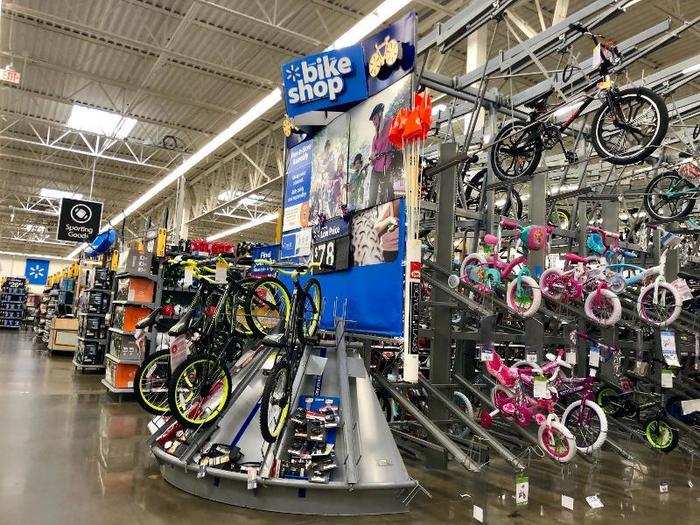
On my way to the department, I walked past shelves of school supplies, the toy department, and the bike shop.
I spotted guns on display directly under the sign for the department.
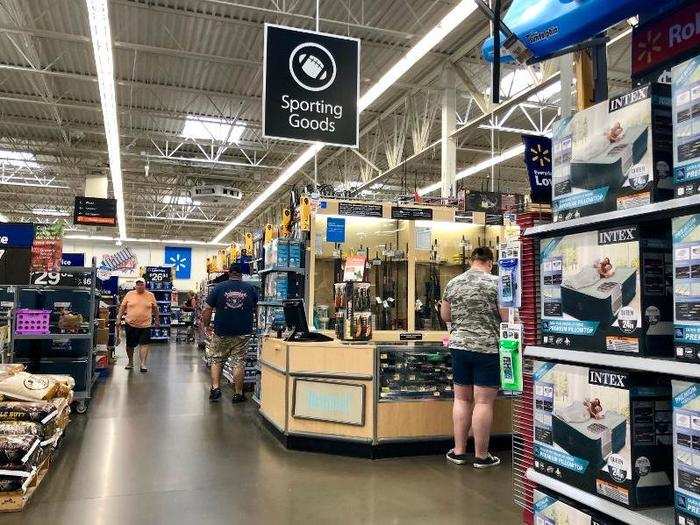
A selection of about 20 rifles and shotguns was displayed inside a locked glass case located behind the sporting goods counter. The guns ranged in price from $159 to $474.
The counter in front of the guns displayed pocket knives, binoculars, and digital night vision monoculars inside a locked case.
The selection of guns was limited compared to nearby gun stores, which offer dozens of different kinds of firearms, including hand guns.
Read more: Walmart CEO promises 'thoughtful and deliberate' response to 2 deadly shootings at its stores
Walmart stopped selling handguns in the 1990s and removed semi-automatic rifles, such as the AR-15, from stores in 2015.
In prepared remarks last week, Walmart CEO Doug McMillon outlined some other Walmart gun sales policies that go beyond federal requirements.
Read more: Walmart: 'It's time' for Congress to debate an assault-weapons ban
For example, Walmart last year raised the age limit to purchase a gun or ammunition to 21. Walmart also only sells a firearm after receiving a "green light" on a background check, while federal law only requires the absence of a "red light" after three business days, he said.
"We videotape the point of sale for firearms, only allow certain associates to sell firearms, and secure firearms in a locking case with individual locks, among other measures," McMillon said.
I told an employee behind the counter that I wanted to buy a gun. They called for a manager.
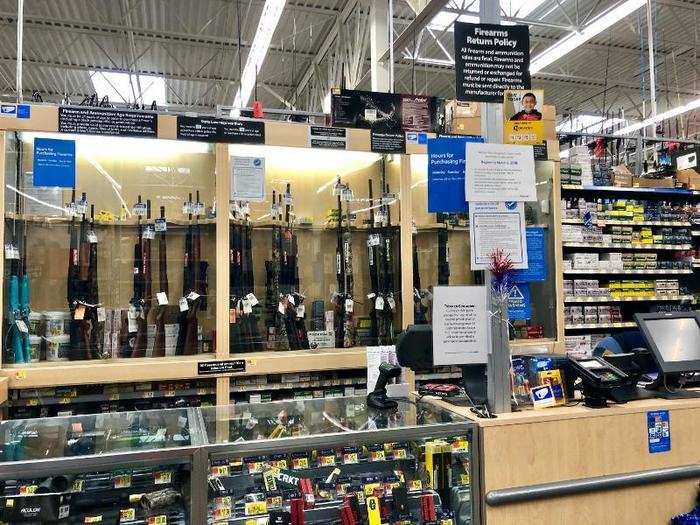
Signs posted around the counter announced that all firearm and ammunition sales are final, and that items may not be returned or exchanged for a refund or repair.
One sign warned that this area of the store is recorded by video. Another reminded shoppers of the laws around gun sales.
Read more: Walmart says viral photo of gun display touting 'own the school year like a hero' was staged
There were no signs promoting or advertising the guns.
Walmart faced backlash on social media this month over a photo of a gun display in one of its stores with a sign hanging overhead that said, "Own the school year like a hero."
Walmart said that photo, which had resurfaced online from 2017, was a prank staged by a non-employee.
While I waited, I browsed the supply of air guns near the firearm sales counter.
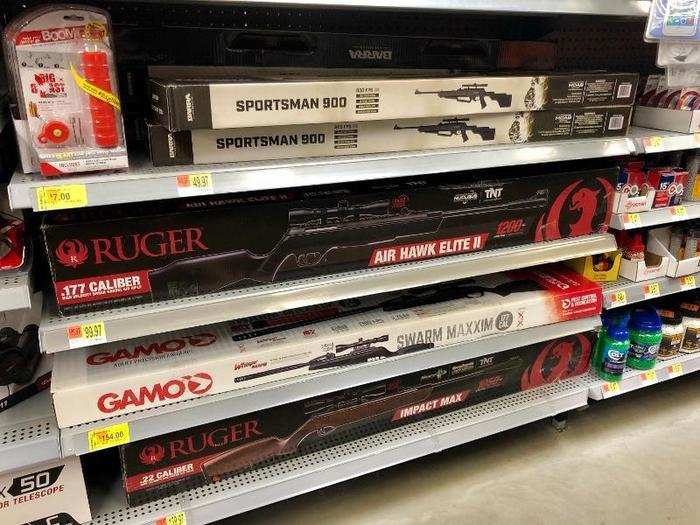
Air guns, pellet guns, and BB guns use air to to propel projectiles, such as pellets. They are designed to be nonlethal.
I also browsed the shelves of ammunition. Walmart said recently that it accounts for about 2% of all gun sales and 20% of ammunition sales in the US.
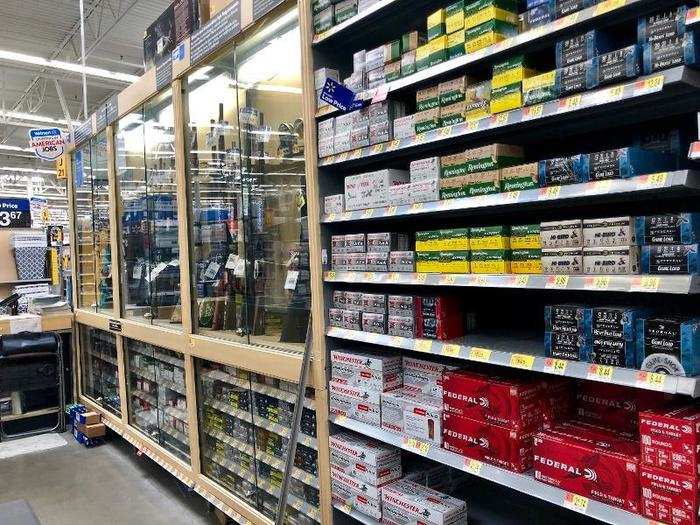
"We estimate that we represent about 2% of the market for firearms today, which we believe places us outside at least the top three sellers in the industry," Walmart CEO Doug McMillon said in prepared remarks last week.
After a few minutes, a Walmart manager arrived at the gun sales counter. She said I could not buy a gun that day because no authorized firearm sellers were scheduled to work.
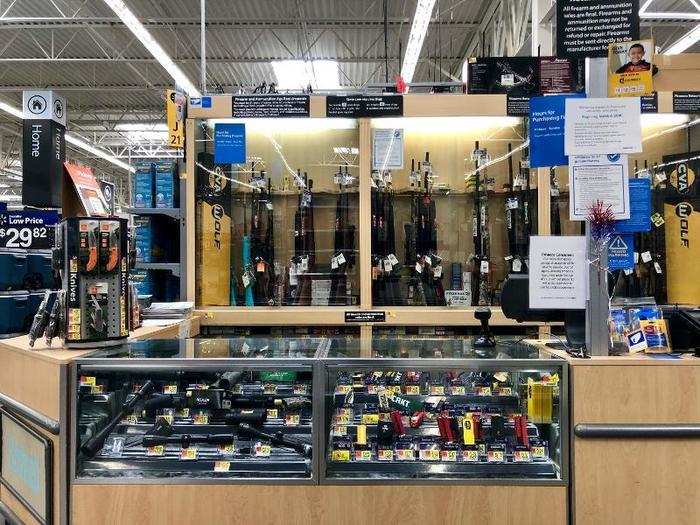
She said I could come back and buy a gun on Thursday, two days later.
A Walmart spokesman later told me that to sell firearms, employees must pass both an enhanced criminal background check and annual online training, which includes a mock gun transaction. The online training is provided by Walmart.
Walmart also complies with state-specific requirements where applicable. Illinois, for example, requires people who sell guns to have a firearm owner identification card, which is issued by state police.
Before I left the store, the manager offered to remove a rifle from the case for me to inspect.
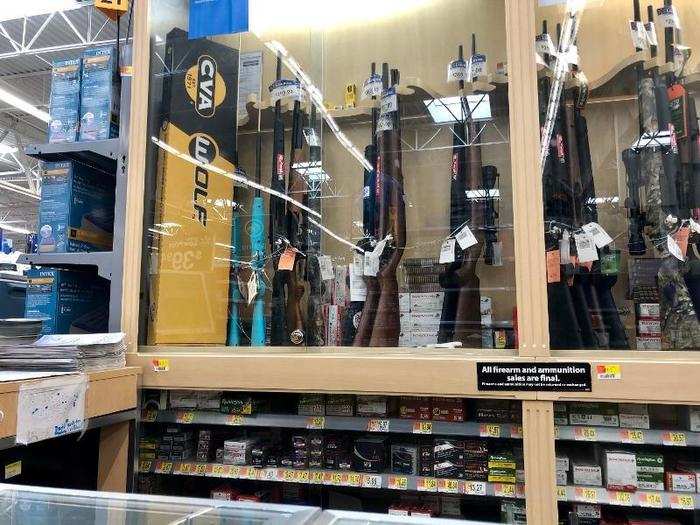
I asked to look at the cheapest one. It cost $159.
When she unlocked the case, I noticed that the rifles were strung together with a metal cord. Each rifle was secured to the cord with plastic zip ties.
The manager cut a zip tie to remove the rifle, and immediately replaced it with a new zip tie when she returned it to the case.
After inspecting the rifle, I left the store and told her I would return two days later.
On Thursday, I drove another 30 minutes to Chesterfield, confident that I would successfully purchase a firearm that day.
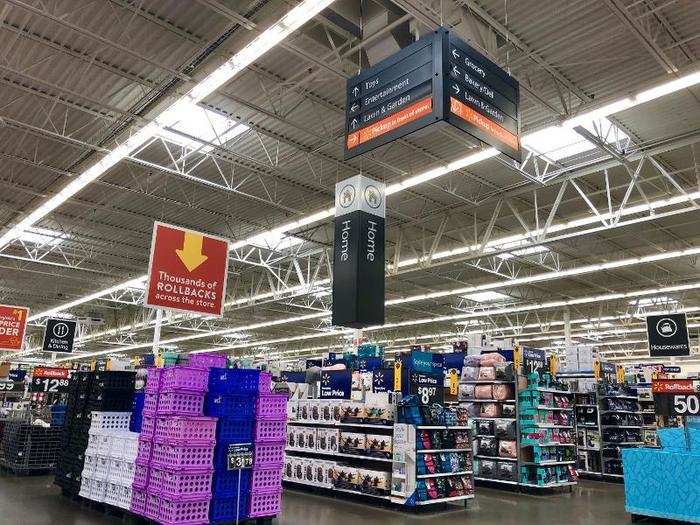
I arrived at the sporting goods department around noon.
There was no one attending the counter by the firearms. After waiting for about 10 minutes, I walked to another aisle and found someone to help me.
I told her I wanted to buy a gun. She said she was an authorized seller and that she could help me. We walked back to the gun display, where she picked up a phone and called someone.
"Can you meet at the the front to help me with a gun sale?" she asked into the phone. She turned to me and said she needed help to ensure the sale process was completed correctly.
She charged me $2 for a federal background check, then left the counter and returned a few minutes later with a form titled: Department of State Police Virginia Firearms Transaction Record.
She told me to complete the form.
I started filling out the necessary paperwork to buy a gun.
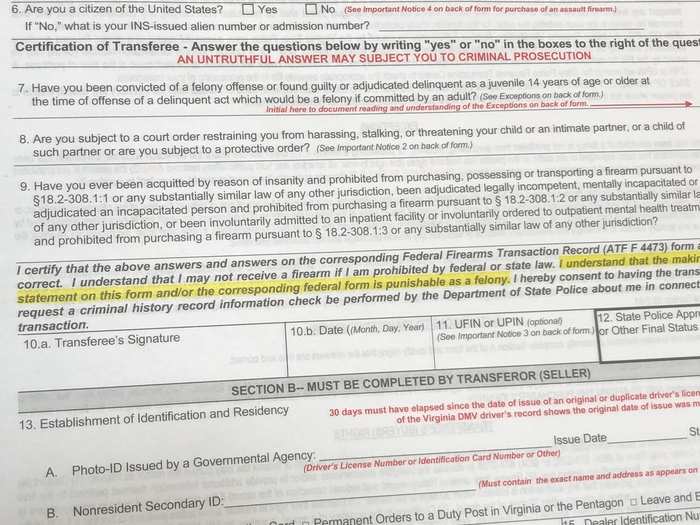
The form asked several obvious questions regarding my name, address, and social security number. It also asked about my race, gender, and US citizenship status.
Under a section called "certification of transferee," it asked about my criminal record — whether I have ever been convicted of a felony, subject to a restraining order, or prohibited from purchasing a firearm, among other specifics.
In red print the form said: "an untruthful answer may subject you to criminal prosecution."
The seller told me that my background check would likely be completed within a few minutes after I finished the paperwork. An employee would then walk the gun out to my car with me, once the purchase was finalized.
But I had only just finished printing my name when she stopped me and asked whether the address on my license matched my home address. I had moved since I obtained my license, and the addresses didn't match.
That was a problem, she said.
To pass the background check, I would need to bring in a government-issued document with my correct address, such as a bill from a state-owned utility or a car registration. (I have never bought a gun, so I wasn't aware of this).
She apologized, told me the rules were strict around background checks, and asked me to come back another time to finish the purchase.
I left the store empty-handed — again.
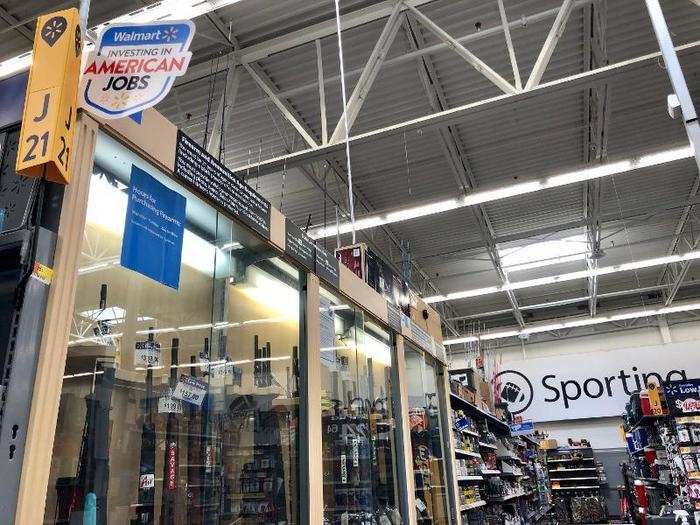
At this point, I decided to give up on buying a gun at Walmart.
I had invested several hours across two days on this. If I were actually in the market for a rifle, I would have gone to a local gun shop instead after about five minutes of unsuccessfully trying to figure out which Walmart stores sell guns.
Overall, the experience left me with the impression that the process of buying a gun at Walmart is more complicated than I expected, and that Walmart takes gun sales and security pretty seriously.
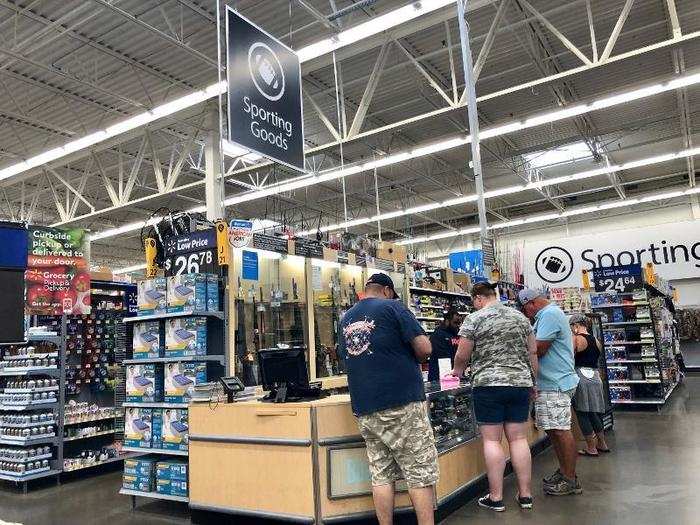
Here's what led to that impression:
- Walmart does not make it easy to figure out which stores sell guns.
- The firearms at Walmart were locked inside a case and secured to one another with zip ties attached to a metal cord.
- Only certain employees can open the case and handle the firearms. These include sporting goods associates or salaried managers who have passed both an enhanced background check and online training provided by Walmart, the company told me. The store employees abided by these rules while I was there.
- When I asked to purchase a gun, the Walmart employee who was authorized to sell guns called for backup to make sure the process was completed correctly.
- Walmart refused to sell me a gun when an authorized seller wasn't present and when the address on my license didn't match my home address, even though those issues could mean a lost sale.
- There were no advertising materials or promotions in the store aimed at luring people to buy guns.
My experience could also help explain Walmart's relatively small share of the US gun sales market, despite the company's size and reach.
The selection of firearms at the Walmart store I visited was extremely limited compared to other stores nearby that focus solely on selling guns.
A Walmart spokesman said my experience supports what the company has said about the sales of firearms in its stores.
"In areas of the country where we sell firearms, we do so safely and in a compliant manner," Walmart spokesman Randy Hargrove said.
Popular Right Now
Popular Keywords
Advertisement